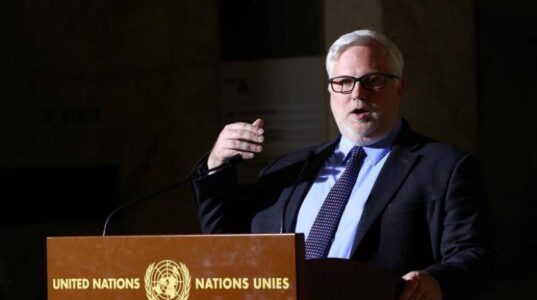
US Envoy accuses Syria and Iran of coordinating with Islamic State terrorists east of Euphrates
The United States has monitored efforts of Syrian President Bashar al-Assad and Iran to coordinate with ISIS to attack areas controlled by the Syrian Democratic Forces (SDF) and destabilize the region, leading to the withdrawal of US forces from the region, according to deputy assistant secretary of state for Levant affairs and the special envoy for Syria, Joel Rayburn.
Speaking during the hearing of the House Foreign Affairs Committee to evaluate US policy toward Syria, Rayburn said that he returned from an expanded tour that included several countries in the region, as well as northeastern Syria.
During his tour, the envoy discussed the efforts of President Donald Trump’s administration to continue to implement its objectives to prevent ISIS resurgence, whether in Syria or Iraq.
Rayburn described the Syrian conflict as “one of the most dangerous crises in the world”, indicating that the Syrian civil society highly values the Caesar Act which was passed by Congress.
He emphasized that he held fruitful talks with SDF leaders and US allies.
The talks focused on the “withdrawal of all Iranian-commanded forces from Syria,” said Rayburn, stressing that all efforts of the enemies of the United States have so far failed to prevent the implementation of the strategy in this country.
He indicated that each of the US major goals in Syria is within reach, adding that adversaries have failed to achieve their goals.
“The strategic situation today is encouraging, and it attests to what can be done when diplomatic efforts are strongly backed by both this Congress and responsible members of the international community.”
The envoy stressed that political and economic pressures on the Assad regime and its enablers will continue until they are forced to stop their inhuman policies against the Syrian people and commit to a political solution in coordination with the Western allies.
Chairperson of the committee congressman Eliot Engel wondered why the Caesar Act had not included non-Syrians, in particular Russian entities.
Rayburn believes that the US will extend the Caesar Act designation to non-Syrians in the future because the Act had a “remarkable chilling effect” even outside Syria and the regime.
He explained that the designation is done in collaboration between the State Department and the Treasury Department to determine the most efficient sanction authorities.
“We need to continue to put accumulating pressure on the Assad regime and its backers in the future.”
Engel called on the administration of President-elect Joe Biden to remember the suffering of the Syrian people, saying that the Assad regime, supported by Russia and Iran, managed to recapture areas previously held by opposition factions, and carried out large-scale cleansing operations.
The congressman wondered what can be done to prevent them from continuing these policies, especially targeting civilians in Idlib.
“After many months of the Assad regime, with Russian and Iranian and Lebanese Hezbollah backing, being able to retake territories, we saw that come to halt when they ran up against Turkish military supporting Syrian armed opposition groups, in February and March of this year,” explained Rayburn.
He noted no indications of the Syrian regime overcoming the military opposition from Turkey and Turkish-backed groups.
Rayburn stated that the US must continue to support the Syrian opposition in the areas it still controls, and provide assistance to the Free Syrian Army that cooperates with Turkey and supports Kurdish-Kurdish reconciliation efforts in those areas.
Source: Aawsat





